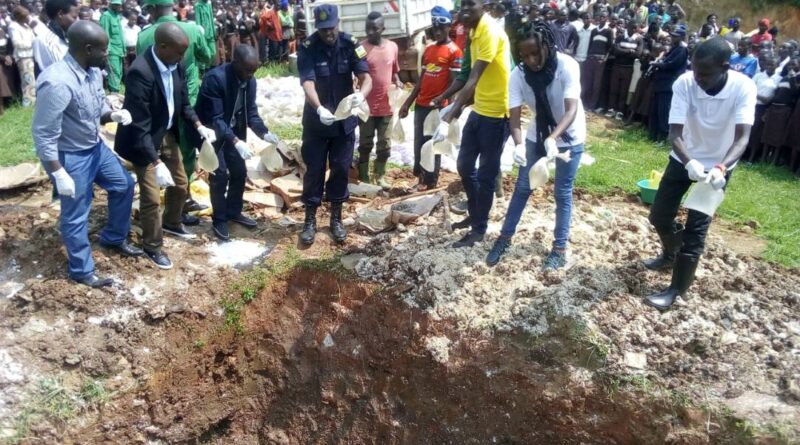RNP to adopt new measures on the destruction of narcotics to prevent environmental harm
The spokesperson of the Rwanda National Police, ACP Boniface Rutikanga, has announced that the police will adopt new and sustainable measures to destroy illegal drugs and prohibited alcoholic drinks in a way that protects both people and the environment.
Speaking during a media briefing with environmental journalists on October 15, 2025, ACP Rutikanga acknowledged the challenges involved in the current practice of burning confiscated narcotics and illicit drinks, confirming that a permanent solution is being sought.
For years, Rwanda Police has been disposing of substances such as marijuana, kanyanga (illicit gin), and locally brewed alcohols like Umumanurajipo, Sinzi undongoye, Nzogejo, Kunjakunja, Umugurutsanyoni, among others, by pouring them into pits and setting them on fire.
However, this method has drawn criticism due to its environmental and health risks. Journalists observed that people involved in the burning process often experience irritation and coughing as a result of the fumes, and most do not wear any protective gear such as masks or gloves.
One journalist asked: “I have witnessed several police operations where drugs and illicit drinks are destroyed. People present don’t wear masks, and many cough due to the smoke. Since these substances are classified as illegal, it’s likely that their composition is harmful. Are there any plans or guidelines to prevent such exposure?”
ACP Rutikanga replied that the issue is under review:“That’s a good observation, and I can confirm that we are working to find a lasting solution. Some items like liquid substances cannot simply be burned because they are flammable or toxic. For example, we used to burn marijuana, but after advice from REMA (Rwanda Environment Management Authority), we stopped doing that.”
He added:“Even items like seized tea or old weapons used to be burned, but based on professional guidance, we discontinued those practices as well. We will now also look into the issue of masks and safety gear. In the future, there will be clear guidelines. We might collaborate with districts to identify isolated, uninhabited areas where destruction can safely take place, though such places are still limited.”
Rwanda Police continues to partner with environmental agencies to protect ecosystems and prevent illegal activities such as unauthorized mining and quarrying, which often lead to land degradation and displacement of communities.
ACP Rutikanga highlighted that such activities endanger public safety as they cause landslides, destroy homes, and damage farmland. He cited examples from Karongi, Gakenke, Rulindo, and Musanze Districts, particularly in hilly areas such as Rwaza and Cyabararika, where unregulated excavation has caused environmental hazards.
The police spokesperson also urged journalists to remain professional and verify all information before publication, warning against the spread of misinformation online.
“Professionalism begins with verifying every detail before sharing it with the public,” he said.
“At Rwanda Police, every report must be backed by verified evidence gathered through multiple channels.”
He explained that the police use a combination of technical and field methods to verify information, including drones, CCTV cameras, helicopters, and on-ground investigation teams. These tools help the police to assess incidents accurately, understand their impact, and identify those responsible.
ACP Rutikanga emphasized that truth verification requires patience, impartiality, and adherence to ethical principles, warning journalists against emotional or rushed reporting that could mislead the public.
“A journalist must be patient and objective. Rushing to publish unverified information destroys credibility and undermines the value of journalism,” he said.
He concluded by encouraging journalists to continue playing an active role in promoting environmental awareness through education and storytelling that helps the public understand the consequences of environmental degradation.



